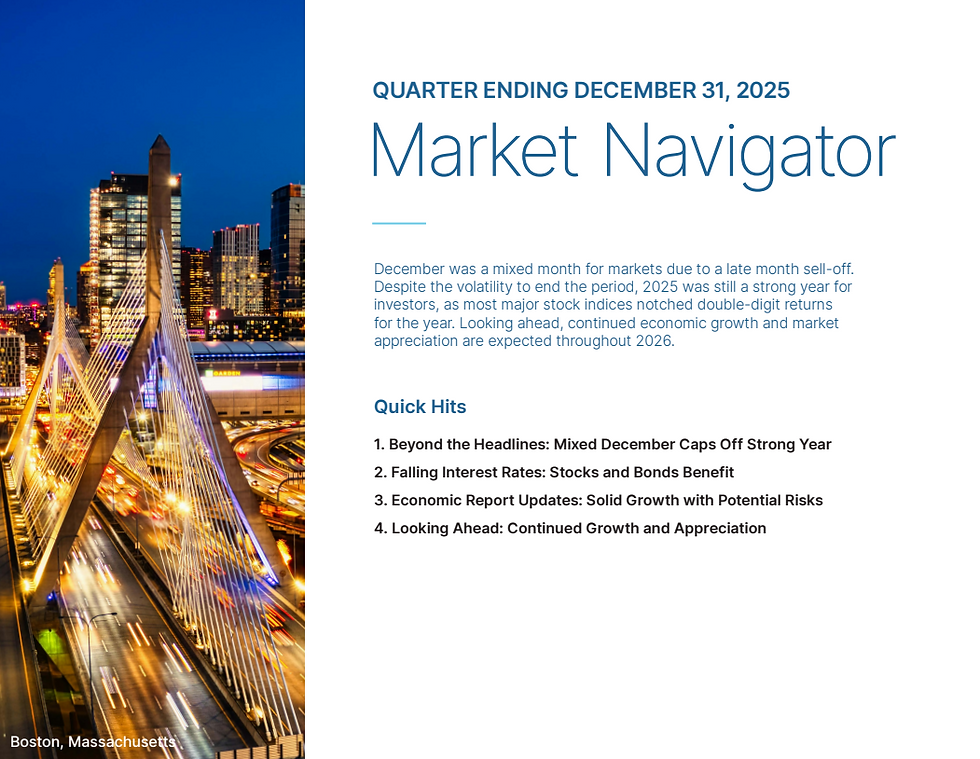The Latest Market Dip: Is This Normal?
- Caitlin Trites
- Aug 5, 2024
- 3 min read
Presented By: Kemple Financial
It’s been a roller-coaster ride in the financial markets, with yesterday (August 5) marking another significant drop worldwide. Japan has been hit particularly hard, but the decline is global. Here in the U.S., as I write this, the S&P 500 is down about 3 percent for the day and nearly 8 percent from its all-time highs. The Nasdaq is doing even worse, down almost 4 percent for the day and 14 percent from its peak.
These numbers might seem alarming, especially if you’re checking your investment accounts. It’s natural to worry about what might come next. When we look at the bigger picture, however, things don’t seem quite so bad.
We’ve Been Here Before
Let’s step back and look at recent history. We’ve seen this pattern before, and it’s happened more often than you might think:
April this year: S&P 500 down more than 5 percent—and bounced back
July through October last year: S&P 500 down more than 10 percent—and bounced back
August through October 2022: S&P 500 down almost 16 percent—and bounced back
In fact, in each of the past couple of years, we have seen a substantial dip—often right around July or August—followed by a market rebound. This current situation looks like the latest in a series of similar events we have seen before.
Looking back further, to 1980, the average intra-year drop in the market is around 14 percent, according to J.P. Morgan. So, the current decline is still within the normal range. Even more reassuring is that despite these pullbacks, the market has had positive returns three out of every four years.
The Big Picture
Although history can guide us, it helps to look at the overall trend for a better understanding of the current situation. One way to do this is by using the 200-day moving average, which shows the general direction of the market. Right now, the S&P 500 and Nasdaq remain above this line, which means the overall trend is still positive.
It’s also worth noting that, even with the current turbulence, markets are still up for the year; the S&P 500 is up more than 8 percent and the Nasdaq is up nearly 8 percent. Those are pretty strong numbers, even after the substantial dip we’ve seen.
Reasons for Optimism Ahead
There are plenty of concerns in the U.S. and globally that weigh on investors, but history suggests markets tend to recover. July and August are typically among the weakest months for market performance, so a summer pullback isn’t really a surprise. As we move toward the end of the year, when performance is usually stronger, we may see a positive shift.
We will also likely see a bounce when this decline ends. According to Bespoke Research, a market consulting firm, after a day like today, markets historically have shown gains of more than 10 percent from the bottom of the dip, almost 9 of 10 times over the past several decades. That means there are also reasons to be optimistic looking forward. The current pullback doesn’t mean markets can’t bounce back; indeed, history says they likely will.
Staying the Course
For investors, here’s the key takeaway: Market dips are normal, even if they’re unsettling every time they happen. But with each past pullback we had similar worries—and markets recovered. This, too, will pass. We will keep an eye on things, but the best course of action remains simply this: keep calm and carry on.
###
Certain sections of this commentary contain forward-looking statements that are based on our reasonable expectations, estimates, projections, and assumptions. Forward-looking statements are not guarantees of future performance and involve certain risks and uncertainties, which are difficult to predict. Past performance is not indicative of future results. All indices are unmanaged and investors cannot invest directly into an index.
Kemple Financial is located at 601 N Main Street East Longmeadow, MA 01028 and can be reached at (413)507-3600. Securities and advisory services offered through Commonwealth Financial Network®, Member FINRA/SIPC, a Registered Investment Adviser.
Authored by Brad McMillan, CFA®, managing principal, chief investment officer, at Commonwealth Financial Network®.
©2024 Commonwealth Financial Network®




Comments